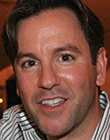2013 Janet Taylor Spence Award
Daniel Casasanto
The New School for Social Research
 What is the focus of your award-winning research?
What is the focus of your award-winning research?
My lab explores the mind in context: how linguistic, cultural, and bodily experiences influence the ways people think, feel, learn, and make decisions. To find out how experience shapes our minds, we test for systematic differences in brain and behavior caused by different patterns of interaction with the physical and social environment; that is, we test for linguistic relativity, cultural relativity, and what I call by analogy bodily relativity. Relativity research can provide new leverage on ancient questions about the nature and origins of knowledge. Our work demonstrates the diversity of the human cognitive repertoire, and at the same time it seeks to clarify how cognitive universals can emerge that transcend variation across individuals and groups, reconciling the apparent incompatibility between “universalist” and “relativist” views. The experiential relativity of the mind arises – inevitably – as a consequence of processes of learning and inference that may be universal, but which operate in distinctive physical and social contexts.
How did you develop an interest in this area?
In graduate school at MIT, I was determined to deal a coup de grâce to the Whorfian hypothesis: the idea that people who speak different languages think differently as a consequence. I failed: the experiments I ran only showed how deep the effects of language on cognition and perception can go! In exploring how language affects thought, I realized we need to expand the notion of relativity to include the body. The languages we speak, the cultures we inhabit, and the bodies we use to interact with the world are ever-present aspects of the context in which we use our minds. Since thinking depends on context, it depends on the specifics of our languages, cultures, and bodies.
Who are your mentors and/or biggest psychological influences?
My PhD advisor Lera Boroditsky has been a huge inspiration. So have Herb Clark, my post doc advisor, and my other thesis advisors Molly Potter, Josh Tenenbaum, and Susan Carey. I owe a special debt to Steven Pinker whose books made me drop what I was doing, and who decided to give a 30-year-old opera singer the chance to become a cognitive scientist. The people who influence my thinking about the mind the most, though, on a day-to-day basis, are my amazing students.
What unique factors have contributed to your early success?
When the young Ernest Hemmingway arrived in Paris for the first time, the suitcase containing all of his early writing was stolen; he later wrote that this was the best thing that could have happened to him as a writer. I had a similar curse-blessing experience. A former collaborator was found to have fabricated results, which meant that to be safe I had to throw away nearly all of the data I had collected for about three years — dozens of experiments, thousands of subjects, all of the papers I had in press — crushing. Recovering from this loss taught me three things: 1) I really love doing cognitive science, no matter what, 2) Good data practices are paramount, and (3) Retracing the steps you take along a theoretical path can be invaluable, leading to new insights.
What does winning this award mean to you both personally and professionally?
It’s a tremendous honor to have our research recognized by APS. Gratifying to know that the work my lab and I find so exciting is of interest to others, too.

